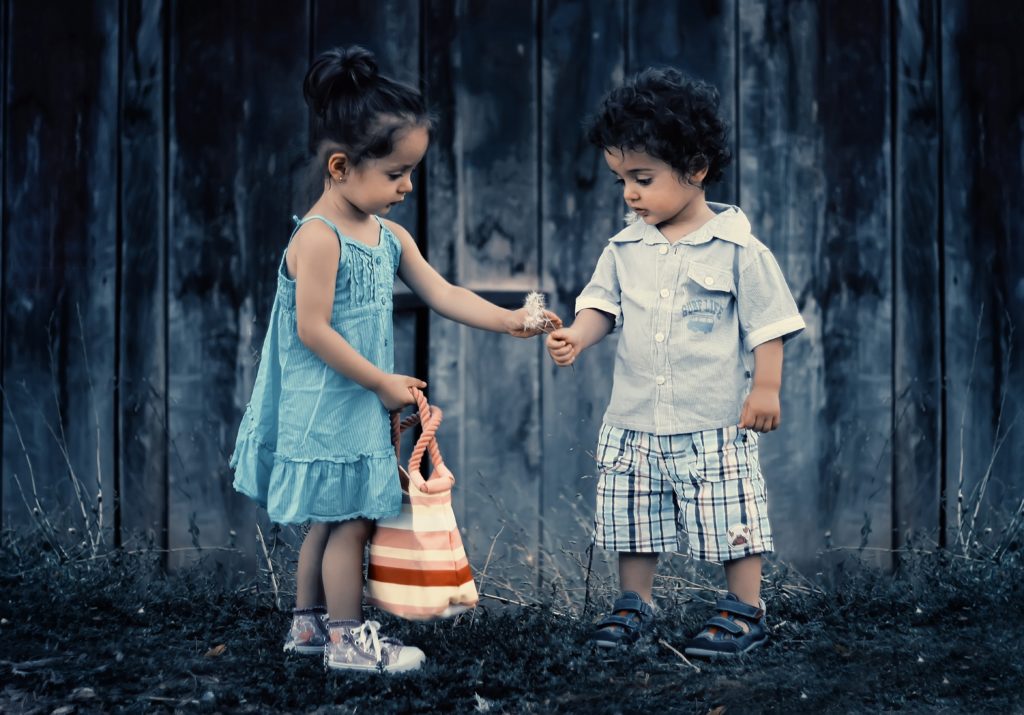If we think back to what we were taught about love and relationships when we were kids, most of us were probably told some version of boy meets girl, boy professes love to girl, girl swoons over boy, and they get married, have kids, and live happily ever after.

My parents didn’t even have to tell me that story with words. They were, and still are, the classic high school sweethearts. They were married at 21. They’re soulmates who literally finish each other’s sentences and come up with the exact same phrases, even when they aren’t in the same room.
Even today, fairy tales, books ,and movies lead our kids to expect just that scenario. Cinderella, Snow White, Sleeping Beauty, and Ariel all suffer their various challenges and each story ends when they’re saved by a man and live happily ever after. For all of them, marriage is the ultimate reward. The idea that you meet someone, have that magical first kiss, and then live happily ever after is alluring, isn’t it?
But our current reality just doesn’t match up with this simple scenario.
The National Center for Family and Marriage Research estimated that approximately 20% of marriages end in divorce, and according to the Pew Research center, fewer than half of kids (46%) live in a family with two parents in their first marriage. Why are the failure rates so high?
Could this be the result of how we’re teaching our kids about relationships?
Our values surrounding love and marriage are certainly changing. When I was in graduate school, my great grandmother thought my work and independence were great and all, but she always asked “When are you getting married already??”. To her, marriage was a way that a woman was taken care of. It was about stability and safety.
This is not surprising, given the origins of marriage. It initially arose as a necessary alliance between families that would result in the consummation of lands, goods, and farm hands. It was a critical economical decision. Even in some cultures today, a dowry is given as payment to the husband for taking care of the wife.

In the US and many other countries, we have now morphed marriage into a beautiful promise of love, faith, and loyalty. But the tendency towards marriage is changing in our society. Historically, approximately 10% of adults in the US were unmarried, but that number has now grown to over 30%! That’s because we no longer need to be married to be happy and/or financially stable.
In today’s world, Cinderella could leave her awful step-family and become the CEO of a successful cleaning business. Ariel would be educated enough to find alternative ways of communicating with Eric. And, according to current US statistics, 4% of the princesses would fall for another princess instead of a prince.
These days, there is so much more complexity to choosing a life partner. It’s no longer about the best financial match. It’s about finding the person that you best connect with. To help our kids to be happy in love, and life, we need to do two main things:
We need to present marriage as a choice rather than a necessity.
Girls, in particular, should be told that it’s ok and maybe even better to pursue other goals in life first. A study by the National Bureau of Economic research showed that college educated women marry later, are less likely to view their marriages as a “financial necessity”, and are happier in their marriages and family life.
We need to set more realistic expectations of what love is.
Science says that our happiness reflects not how well things are going, but whether they are going better than expected. If you’re setting kids up with expectations of a fairy tale, they are guaranteed to be disappointed. But that’s not to say that we can’t tell them the great things about love and relationships. We should just be more honest about the realities of the journey.
So what kind of expectations should we set for our kids?
Well first, it’s true that love is absolutely amazing. It’s a wonderful, indescribable feeling that can make your head swim, your heart beat out of your chest, and the whole world seem like a brighter and more beautiful place. That’s why there are so many great songs on the radio about it! We certainly should be telling our kids to expect that. But there is also more.
Some of the things that I plan to tell my girls include:
- Don’t be afraid to follow your heart and take a risk. We’ve all seen those movies where two people love each other and everyone knows it, but both of them are too afraid to say it. We yell at the TV, “Just tell him/her already!”. Don’t be that movie character. Be brave! If you love someone, say it, go for it. Even if it seems completely crazy, just speak your heart and your mind. You might fall on your face, but then you might just have the ride of your life too.
- You’ll have to be vulnerable. From laughing together when the first person shows that they actually have bodily functions, to bearing your soul and trusting someone not to tear it apart, real love requires you to be brave enough to show someone your imperfections. That vulnerability feels simultaneously terrifying and exhilarating.
- At some point, you’ll probably argue. Fighting is normal, and even good for the relationship! You’ll dig your heels in and decide that you’re exactly right, and your partner will do the same. Maybe in that moment, you’ll wonder why you’re together at all. But it was a show of honesty. In the right relationship, you’ll make up, and you’ll now know that your relationship is strong enough to handle a little disagreement.
- You shouldn’t have to be fake. A good partner will love you for your authentic self. You should be able to feel comfortable saying absolutely anything to this person. It should just flow out of you. That’s how you know that what you have is something real.
- You’ll find something (or even many things!) about your partner annoying. Maybe they’re a little judgmental, maybe they like to “fix” everything. Maybe their car is messy, their glasses are always spotty, or they’re a bit anal . Maybe they snore. You will somehow simultaneously love and roll your eyes at those parts of the person.
- And sometimes, it doesn’t work out. Love can mean letting someone go, even when you want to scream at them to stay, because you love them enough to honor what they want. It can mean falling for more than one person and having to make the hardest choices of your life. When these things happen, this isn’t a reflection of your own worth. You are still the same incredible person you were before it all went down.
Movies and fairy tales tell our kids to expect a nice calm train ride through a rolling meadow to get to love. In reality, it’s often a fun and dizzying and, at times, stomach-dropping ride on a roller coaster through all kinds of terrain. If kids feel like they somehow missed the calm train and didn’t meet societal expectations, it can cause decreased feelings of self worth, anxiety, and even depression.

What’s the take-home?
The bottom line is that it is important to prepare kids for what they might actually experience rather than what was expected by society decades ago. Instead of hiding our daily struggles from our kids, we need to show them that those struggles exist, and that love can survive them. Instead of giving our kids a set of guidelines about the specifics of what their relationships should look like, we should be focusing on the skills needed for forming healthy relationships, with whomever they choose, whenever they choose, like:
- How to be compassionate
- How to compromise
- How to listen attentively and stay curious about each other
- How to keep the passion going
- How to strike a balance of self love and love for someone else
- How to be honest and also kind at the same time
- How to trust and, in turn, earn trust, and
- How to recognize when a relationship is healthy and when it is not
I hope my girls will someday get carried away in that wonderful feeling that is love. I hope that they find that electrifying chemistry, that they can give their whole selves to someone, and value themselves enough to receive the love and compassion that someone else gives them. And I hope they are open and fearless enough to enjoy the ride. All the rest of the story is up to them to write.
What honest advice would you give to your kids about love and relationships? Leave your thoughts in the comments below!









